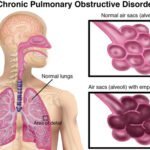Are you aware of the impact that stress can have on your respiratory condition? It may come as a surprise, but stress can actually worsen existing respiratory issues or even trigger new ones. When you experience stress, your body responds by releasing stress hormones that can affect your breathing, causing shortness of breath, chest tightness, or even asthma attacks. In this article, we will explore the ways in which stress can directly impact your respiratory condition and provide insights on how to manage it effectively. Don’t let stress take a toll on your respiratory health – read on to learn more!

1. Overview of Respiratory Conditions
Common respiratory conditions
Respiratory conditions refer to a range of diseases and disorders that affect the lungs and the respiratory system. Some common examples of respiratory conditions include asthma, chronic obstructive pulmonary disease (COPD), bronchitis, pneumonia, and allergies. These conditions can vary in severity and can have a significant impact on an individual’s overall health and quality of life.
Causes and symptoms
Respiratory conditions can have various causes, including genetic factors, environmental factors, and lifestyle choices. Exposure to pollutants, such as cigarette smoke or air pollution, can contribute to the development of respiratory conditions. Infections, allergies, and certain occupational hazards can also play a role.
The symptoms of respiratory conditions can vary depending on the specific condition. Some common symptoms include shortness of breath, coughing, wheezing, chest tightness, and difficulty breathing. These symptoms can range from mild to severe and can significantly affect the daily life of individuals with respiratory conditions.
Impact on daily life
Living with a respiratory condition can have a profound impact on daily life. Breathing difficulties can limit physical activities, making it challenging to engage in exercise or even perform simple tasks. Individuals may experience fatigue, decreased stamina, and reduced quality of sleep. The need for frequent medical appointments, medication management, and adjustments to lifestyle can also add stress and burden to daily life.
2. Understanding Stress
Definition of stress
Stress is a natural physical and mental response to demanding situations. It is the body’s way of preparing itself to face a perceived threat or pressure. While some stress can be beneficial and motivating, excessive and prolonged stress can have detrimental effects on physical and mental well-being.
Types of stress
There are various types of stress that individuals may experience. Acute stress is a short-term response to a specific event, such as an exam or a job interview. Chronic stress, on the other hand, persists over an extended period and can result from ongoing pressures such as work-related stress or relationship difficulties.
Causes of stress
Stress can be caused by a wide range of factors, including work-related pressures, financial problems, relationship issues, major life changes, and traumatic events. It is important to note that different individuals may perceive and react to stress differently. What may be stressful for one person may not be for another. Identifying and understanding the specific stressors in your life can be essential in effectively managing stress.

3. Stress and Respiratory System
Effects of stress on respiratory system
Stress can have significant effects on the respiratory system. When you experience stress, your body enters a “fight-or-flight” response, triggering physiological changes. This response activates the sympathetic nervous system, causing increased heart rate, rapid breathing, and elevated blood pressure. As a result, stress can directly impact the functioning of the respiratory system, exacerbating existing respiratory conditions or even triggering new symptoms.
Impact on breathing
One of the most noticeable effects of stress on the respiratory system is changes in breathing patterns. When stressed, you may breathe more quickly and shallowly, which can lead to hyperventilation. This can disrupt the balance of oxygen and carbon dioxide in the body, potentially worsening respiratory symptoms such as breathlessness, wheezing, and chest tightness.
Inflammation and respiratory conditions
Stress can also contribute to inflammation in the body, including the respiratory system. Chronic inflammation can worsen respiratory conditions, leading to increased severity of symptoms and reduced lung function. Inflammation can also make individuals more susceptible to infections and exacerbate existing respiratory conditions, further compromising respiratory health.
4. Stress-Induced Hyperventilation
How stress can lead to hyperventilation
Stress can induce hyperventilation, a condition characterized by rapid and deep breathing. When stressed, your body produces excess adrenaline, which can stimulate over-breathing. This leads to an imbalance in the levels of oxygen and carbon dioxide in the body, causing various symptoms such as lightheadedness, dizziness, chest discomfort, and tingling sensations.
Symptoms of stress-induced hyperventilation
The symptoms of stress-induced hyperventilation can vary but may include shortness of breath, rapid breathing, chest pain, palpitations, and feelings of panic or anxiety. These symptoms can be distressing and may further exacerbate stress and anxiety levels, creating a cycle of stress and respiratory distress.
Management techniques
Managing stress-induced hyperventilation requires a multi-faceted approach. One effective technique is to practice slow, diaphragmatic breathing, which helps regulate the levels of oxygen and carbon dioxide in the body. This can be achieved by taking slow, deep breaths and focusing on breathing from the diaphragm rather than shallowly from the chest. Additionally, engaging in relaxation techniques, such as mindfulness meditation and gentle physical activity, can help reduce stress levels and promote overall well-being.

5. Asthma and Stress
Relationship between asthma and stress
Stress and asthma have a bidirectional relationship. While stress can worsen asthma symptoms, the presence of asthma itself can also contribute to stress and anxiety. The fear of an asthma attack and the impact of limitations on daily life can cause additional emotional distress, further exacerbating stress levels.
Stress as a trigger for asthma attacks
Stress can act as a trigger for asthma attacks in individuals with the condition. When stressed, the body releases stress hormones that can cause airway constriction and inflammation, leading to increased asthma symptoms. Additionally, stress can impair immune function, making individuals more susceptible to respiratory infections, further complicating asthma management.
Managing stress to control asthma
Effectively managing stress is crucial for individuals with asthma. Techniques such as stress-reduction practices, regular exercise, maintaining a healthy lifestyle, and seeking social support can help reduce stress levels and minimize the risk of asthma exacerbations. It is also important to work closely with healthcare professionals to develop an individualized asthma management plan that includes stress management strategies.
6. Chronic Obstructive Pulmonary Disease (COPD) and Stress
Impact of stress on COPD symptoms
Stress can have a significant impact on the symptoms and progression of chronic obstructive pulmonary disease (COPD). Excessive stress can exacerbate COPD symptoms, leading to increased breathlessness, coughing, and fatigue. Stress can also lower immunity, making individuals with COPD more vulnerable to respiratory infections, which can further worsen their condition.
Stress-relief strategies for COPD patients
COPD patients can benefit from stress-relief strategies to improve their overall well-being and COPD management. Techniques such as relaxation exercises, deep breathing exercises, and engaging in enjoyable activities can help reduce stress levels and promote a sense of calm. Additionally, participating in support groups and seeking professional counseling can provide COPD patients with the emotional support they need to cope with the challenges of living with a chronic respiratory condition.
Improving quality of life
By effectively managing stress, individuals with COPD can enhance their overall quality of life. By reducing stress levels, they can experience improved symptom control, reduced anxiety, increased energy levels, and better sleep quality. It is essential for COPD patients to work closely with their healthcare team to develop a comprehensive management plan that addresses both the respiratory symptoms and the emotional well-being associated with the condition.
7. Anxiety and Respiratory Conditions
Bidirectional relationship between anxiety and respiratory conditions
Anxiety and respiratory conditions often have a bidirectional relationship. On one hand, having a respiratory condition can lead to increased anxiety due to the fear of breathlessness, the impact on daily activities, and concerns about the progression of the condition. On the other hand, anxiety can also contribute to the development or worsening of respiratory symptoms, potentially leading to a cycle of anxiety and respiratory distress.
Anxiety disorders and breathing difficulties
Anxiety disorders can manifest in various ways and can significantly impact an individual’s breathing pattern. Some individuals may experience hyperventilation, while others may have shallow breathing or a feeling of being unable to take a deep breath. This can exacerbate respiratory symptoms and contribute to a state of heightened anxiety. It is important to address both the anxiety and respiratory aspects of the condition to achieve effective management.
Treatment approaches
The treatment of anxiety and respiratory conditions requires a comprehensive approach. Cognitive-behavioral therapy (CBT), a type of therapy that focuses on identifying and changing negative thought patterns and behaviors, can be beneficial in managing anxiety related to respiratory conditions. Breathing retraining techniques, such as diaphragmatic breathing and paced breathing, can also help individuals regain control over their breathing and reduce anxiety symptoms. In some cases, medications may be prescribed to manage anxiety symptoms, but this should be discussed with a healthcare professional.
8. Techniques to Reduce Stress
Mindfulness and meditation
Mindfulness and meditation practices can be effective in reducing stress levels and promoting overall well-being. These practices involve focusing on the present moment, cultivating a non-judgmental attitude, and engaging in deep relaxation. Regular mindfulness meditation can help individuals develop a sense of calm, reduce stress hormones, and improve emotional resilience.
Deep breathing exercises
Deep breathing exercises are a simple yet powerful technique for reducing stress. By taking slow, deep breaths and focusing on the breath, individuals can activate the body’s relaxation response and promote a sense of calm. Practices such as diaphragmatic breathing, square breathing, and 4-7-8 breathing can be incorporated into daily routines to help manage stress and improve overall respiratory function.
Physical activity and stress reduction
Engaging in regular physical activity is a great way to reduce stress and improve respiratory health. Exercise releases endorphins, which are natural mood-boosting chemicals in the brain. It can also improve lung function, increase cardiovascular fitness, and enhance overall well-being. Find an activity that you enjoy, such as walking, swimming, or yoga, and aim for at least 150 minutes of moderate-intensity exercise per week.
9. Seeking Professional Help
Medical interventions for stress-related respiratory symptoms
In some cases, medical interventions may be necessary to manage stress-related respiratory symptoms. This could include the use of bronchodilators or corticosteroids to alleviate symptoms, reduce inflammation, and improve lung function. It is important to consult with a healthcare professional to determine the most appropriate treatment options based on individual needs and medical history.
Consulting a healthcare professional
If you are experiencing persistent respiratory symptoms or an increase in stress levels, it is essential to consult with a healthcare professional. They can help diagnose and manage underlying respiratory conditions, provide guidance on stress management techniques, and tailor a treatment plan to suit your specific needs. Regular follow-ups will also ensure that your condition is effectively monitored and managed over time.
Therapies and treatments
In addition to medical interventions, various therapies and treatments can help manage stress-related respiratory symptoms. These may include pulmonary rehabilitation programs, which aim to improve lung function, physical fitness, and overall well-being. Other treatment options may include psychotherapy, counseling, and stress management courses.
10. Lifestyle Changes
Stress management techniques in daily life
Incorporating stress management techniques into your daily life can help reduce the impact of stress on your respiratory condition. This can include setting aside time for relaxation and self-care activities, such as mindfulness meditation, engaging in hobbies, and spending time with loved ones. Establishing a balanced routine, prioritizing sleep, and managing work-life balance can also contribute to stress reduction.
Healthy habits to support respiratory health
Maintaining a healthy lifestyle is crucial for supporting respiratory health and managing stress. This includes adopting a balanced and nutritious diet, staying hydrated, avoiding smoking and exposure to second-hand smoke, and reducing exposure to environmental pollutants. Regular exercise and good sleep hygiene are also essential for improving respiratory function and overall well-being.
Creating a supportive environment
Creating a supportive environment is important for individuals with respiratory conditions. This can involve communicating your needs to family, friends, and coworkers, educating them about your condition, and seeking their understanding and support. Building a network of social support can significantly reduce stress levels and enhance overall well-being.
In conclusion, stress can have a significant impact on respiratory conditions, exacerbating symptoms, and impairing overall well-being. Understanding the relationship between stress and respiratory health is essential for effectively managing these conditions. By incorporating stress-reduction techniques, seeking professional help, and making lifestyle changes, you can better manage stress and improve your respiratory condition, ultimately enhancing your quality of life.
Remember, managing stress is a journey, and it is important to be patient and kind to yourself. By prioritizing your well-being and taking proactive steps to reduce stress, you can regain control over your respiratory health and live a more fulfilling and healthier life.









